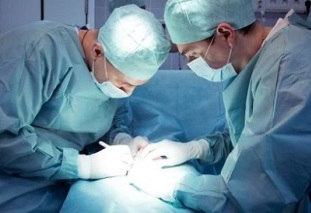
The surgical method of thickening the penis through skin flap and fat skin flap transplantation is a response to the transient effect of subcutaneous liposuction. If we compare this method of penis enlargement with the introduction of fat cells, then it requires high professional skills.
The penis thickens and the skin and fat flaps darken, which means more complex interventions and a high risk of injury. Therefore, before performing surgery, patients should weigh the pros and cons.
Transplantation of skin and fat flaps leads to penis enlargement
The operation time under general anesthesia is several hours. It all starts with collecting the graft. In most cases, they are transplanted from the patient's buttocks area, because this subcutaneous layer is characterized by a greater density and a greater number of connective tissue compartments. You can also use skin and fat flaps taken from the groin area.
The area of direct sampling depends on the size of male reproductive organs. As a result, the surgeon may not be limited to just one implant. After suture the defect area in the donor area, an incision is made on the shaft of the penis. The skin and fat flaps are inserted under the upper layer of the penis skin by a specialist. After the transplantation process is complete, the surgeon will suture the incision.
As mentioned earlier, donor skin and fat flaps are most commonly found in the hip area. This material has a low fat content, so it does not lose much density during the transplantation process. During sitting, the cells of the adipose tissue of the hip flap are under pressure from the trunk, so they have a dense structure.
What are the indications and contraindications

Unsatisfactory penis thickness can cause serious psychological problems. This may have a negative impact on a person's self-esteem and his success in private life. As a result, the indications for surgery have medical, psychological and aesthetic properties.
Regarding contraindications, men must be checked before undergoing surgery to make the penis thicker. If the patient faces mental, genitourinary, cardiovascular or immune problems, surgical intervention will be suspicious.
It is important to pay attention to the ability of blood to clot and make sure that there is no damage to the skin of the penis and the donor area (buttocks, groin). The list of contraindications is supplemented by diabetes and inflammatory processes.
Rehabilitation time and results
On the one hand, the transplantation of skin flaps and fat skin flaps has a longer effect than lipid filling, but on the other hand, due to insufficient blood supply of the epidermis, implants without epidermis may be rejected. The risk of changing the contour of the shaft of the penis due to the uneven density of the natural graft cannot be ruled out.
In view of the high risk of rejection of skin and fat masses and the emergence of inflammatory processes, experts are increasingly discouraging patients from undergoing this kind of surgery, and recommending myocutaneous flap transplantation.

Such an operation can maintain the correct blood supply to the graft and also ensure that the penis becomes thicker for life.
The advantages and disadvantages of using fatty skin flaps include:
- , unlike lipid filling, more stable results are observed;
- Despite the scars, the donor area still retains its beauty.
- The materials used have minimal density loss.
Disadvantages:
- The financial aspect of the problem;
- The risk of skin and fat flap rejection;
- The possibility of deformation of the shaft of the penis;
- The risk of postoperative wound suppuration.














































